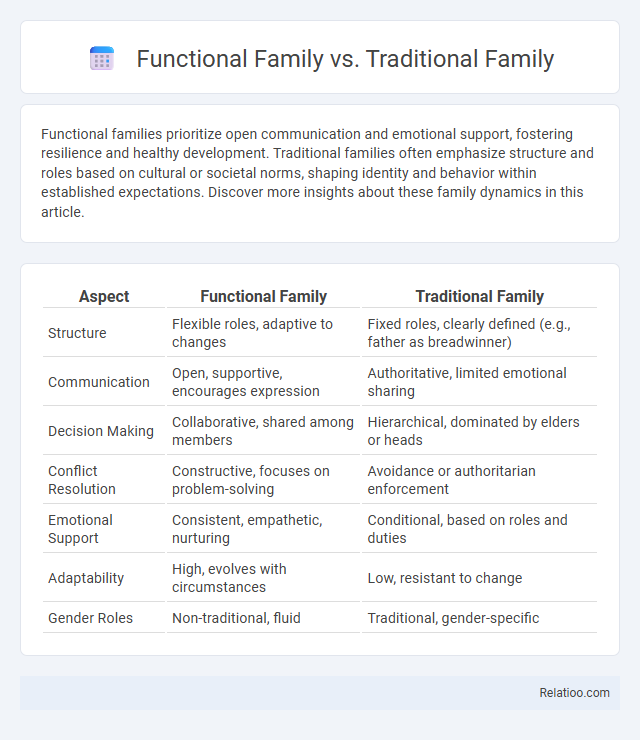Functional families prioritize open communication and emotional support, fostering resilience and healthy development. Traditional families often emphasize structure and roles based on cultural or societal norms, shaping identity and behavior within established expectations. Discover more insights about these family dynamics in this article.
Table of Comparison
| Aspect | Functional Family | Traditional Family |
|---|---|---|
| Structure | Flexible roles, adaptive to changes | Fixed roles, clearly defined (e.g., father as breadwinner) |
| Communication | Open, supportive, encourages expression | Authoritative, limited emotional sharing |
| Decision Making | Collaborative, shared among members | Hierarchical, dominated by elders or heads |
| Conflict Resolution | Constructive, focuses on problem-solving | Avoidance or authoritarian enforcement |
| Emotional Support | Consistent, empathetic, nurturing | Conditional, based on roles and duties |
| Adaptability | High, evolves with circumstances | Low, resistant to change |
| Gender Roles | Non-traditional, fluid | Traditional, gender-specific |
Defining Functional and Traditional Families
Functional families provide a supportive environment where members communicate effectively, share responsibilities, and foster emotional well-being, creating stability and growth. Traditional families often emphasize defined roles based on cultural or societal norms, focusing on structure and continuity across generations. Understanding your family's dynamics helps recognize whether it aligns more closely with functional adaptability or traditional conventions.
Key Characteristics of Functional Families
Functional families demonstrate strong communication, emotional support, and adaptability, fostering healthy relationships and effective problem-solving. Traditional families often emphasize defined roles and hierarchical structures rooted in cultural or religious norms, which may limit flexibility but provide stability. Functional families prioritize mutual respect, responsibility, and open dialogue, distinguishing them from other family types by promoting resilience and well-being.
Core Traits of Traditional Family Structures
Traditional family structures emphasize defined roles, typically with a breadwinner father and homemaker mother, fostering stability through clear expectations and hierarchical organization. Core traits include multigenerational living, strong kinship ties, and adherence to cultural or religious norms that guide behavior and responsibilities. Understanding these characteristics helps you appreciate how traditional families maintain cohesion and support within their communities.
Communication Patterns: Functional vs. Traditional
Communication patterns in functional families emphasize open dialogue, active listening, and emotional support, fostering strong connections and conflict resolution. Traditional families often rely on hierarchical communication, where instructions flow top-down and emotional expression may be limited, potentially hindering mutual understanding. Your ability to navigate these distinct communication styles can enhance family cohesion and promote healthier interactions.
Parenting Approaches in Both Family Models
Functional family models prioritize open communication, emotional support, and adaptability in parenting approaches, fostering healthy child development and resilience. Traditional families often emphasize structured roles, discipline, and clear authority hierarchies, promoting stability and respect for social norms but sometimes limiting emotional expressiveness. Your parenting approach can benefit from blending functional flexibility with traditional consistency to create a balanced environment conducive to nurturing well-rounded children.
Emotional Support Systems Compared
Functional families prioritize strong emotional support systems through open communication, empathy, and conflict resolution, fostering resilience and psychological well-being. Traditional families often rely on established roles and hierarchical structures that may limit emotional expression but provide stability and clear expectations. Compared to dysfunctional families, both functional and traditional families demonstrate healthier emotional dynamics, though functional families typically exhibit greater flexibility in adapting support to individual needs.
Flexibility and Adaptability in Family Roles
Functional families demonstrate high flexibility and adaptability in family roles, allowing members to share responsibilities based on evolving needs and circumstances. Traditional families often adhere to rigid, predefined roles, where roles are assigned by gender or age, limiting adaptability during changing situations. Your ability to foster flexibility within your family can enhance resilience and improve overall family dynamics, supporting healthy communication and cooperation.
Conflict Resolution Methods in Each Family Type
Functional families employ open communication and collaborative problem-solving, allowing family members to express emotions and resolve conflicts constructively. Traditional families often rely on hierarchical roles and established authority, where elders or parents mediate disputes to maintain harmony and stability. Your ability to navigate conflicts improves when understanding these distinct conflict resolution methods, as functional families prioritize mutual respect while traditional families emphasize order and adherence to family roles.
Impact on Child Development and Well-being
Functional families provide a stable environment with consistent emotional support, promoting healthy child development and psychological well-being. Traditional families, while often emphasizing defined roles and cultural values, may vary in their impact depending on communication quality and parental involvement. Dysfunctional families typically hinder emotional resilience and cognitive growth, increasing risks of behavioral and mental health issues in children.
Adapting Family Values in a Modern Society
Functional families prioritize adaptability and open communication, allowing them to navigate the evolving demands of modern society effectively. Traditional families often uphold fixed roles and long-established values, which can sometimes hinder flexibility in dynamic social environments. Your ability to balance these approaches by integrating core family values with modern expectations fosters resilience and cohesion in contemporary family life.

Infographic: Functional Family vs Traditional Family
 relatioo.com
relatioo.com